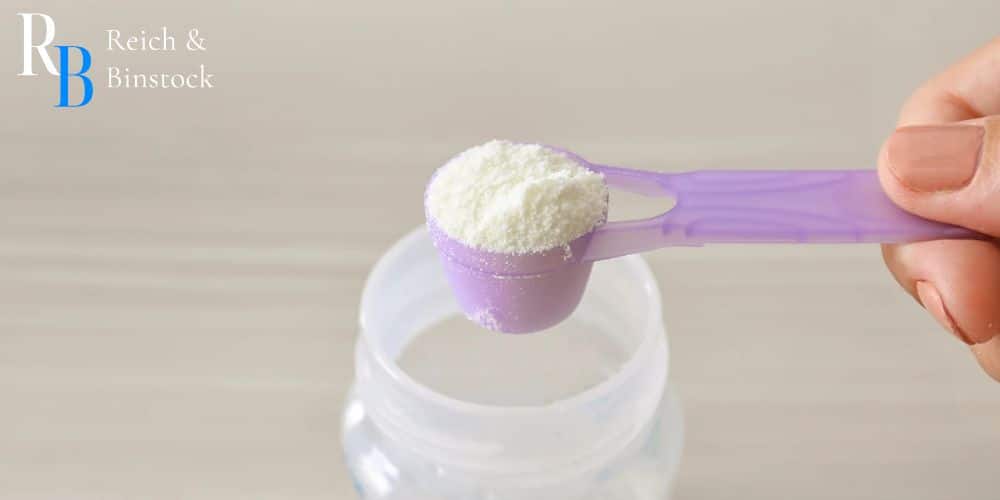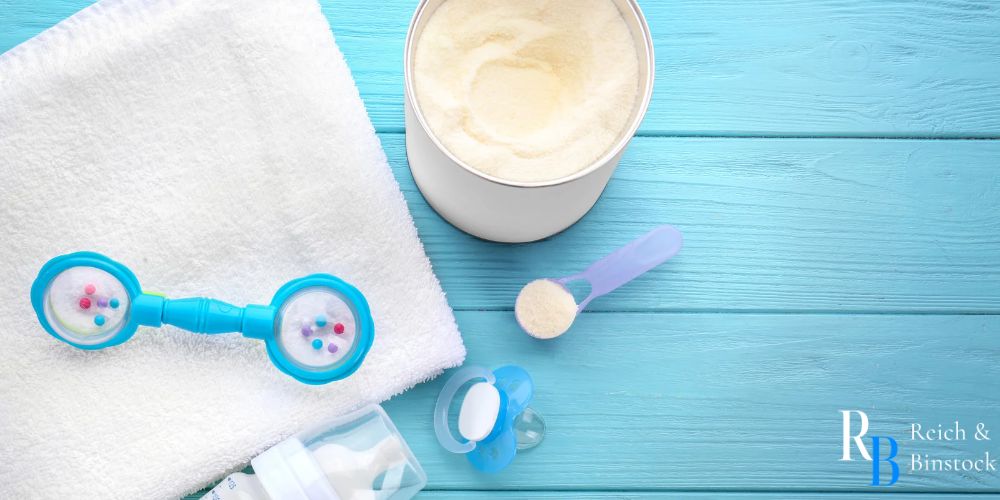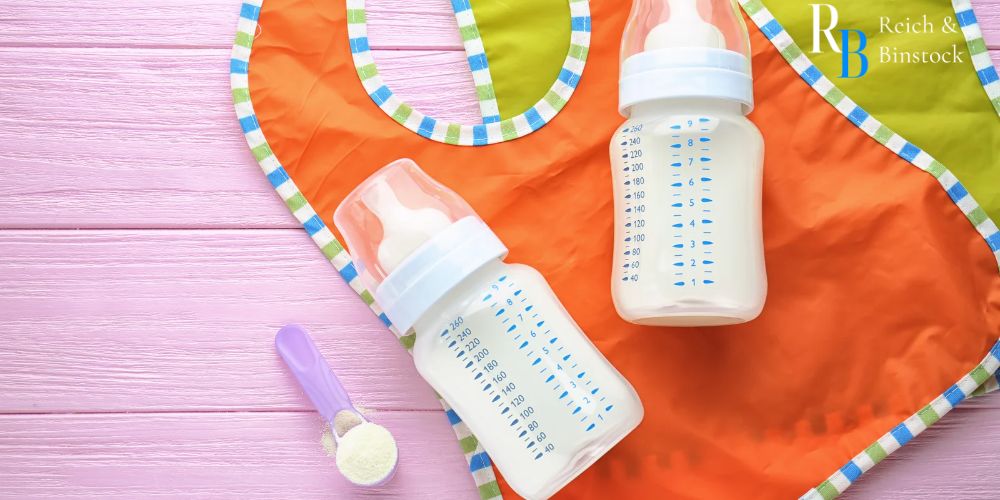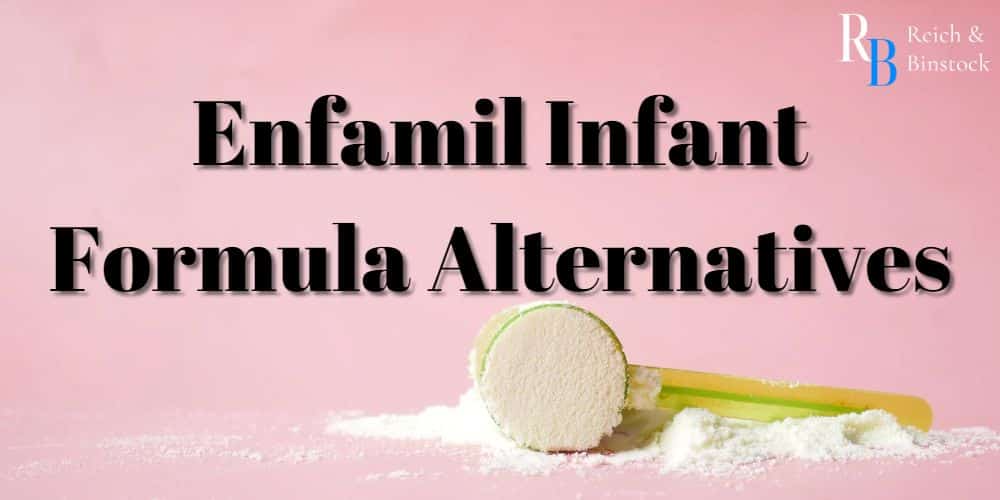Keeping your children fed and happy is an important part of being a parent. Infants are totally dependent on their caregivers for nourishment. While many women choose to breastfeed, some people simply don’t have the option. Some mothers are unable to produce enough milk, babies are unable to latch, or any number of other reasons that make breastfeeding or pumping too difficult. Adopting and fostering parents often don’t have the option to offer breastmilk for their newborn infant. Many parents choose to use baby formula to feed their children. Baby formula has all the necessary nutrients that your baby needs to thrive.
Unfortunately, some Enfamil infant formulas can cause more harm than good. With so many different options available on the market, it can be difficult to choose the right formula for your baby. In severe cases, some types of formula can even lead to dangerous and often life-threatening health conditions.
At Reich & Binstock, our team knows how important it is to protect your family. Enfamil is a popular cow milk-based formula that has been altered to resemble human breast milk. It has been linked to intestinal damage and lethal diseases in infants. We’ve put together this list of the most popular Enfamil infant formula alternatives to help you choose the best for your baby. Many parents don’t make the switch to a better formula until it’s too late. If your baby was harmed due to Enfamil baby formula, contact the experienced class action lawyers at Reich & Binstock today. We aren’t afraid to take on large corporations when their products cause injuries to vulnerable victims. For more information about how we can help, call us today at (713) 622-7271 for a free consultation.
Types of Baby Formula

Many babies use formula from birth and continue until around a year old, even after introducing solid foods at around six months. Baby formula is an easy way for your baby to get all the essential nutrients they need to grow and thrive.
Baby formula comes in three different forms: powdered formula, concentrated liquid formula, and ready-to-use liquid formula. Powdered and concentrated formulas have to be mixed with distilled water. Powdered formula is the least convenient and the least expensive, while ready-to-use bottles are the most expensive but most convenient. Most ready-to-use bottles are single-serve (2 fl oz). Most brands of formula are available in all three forms, and parents can choose which form to use based on their budget and convenience.
The Food and Drug Administration (FDA) regulates commercial baby formulas. The three major types of baby formula are cow milk-based formulas, soy-based formulas, and protein hydrolysate formulas.
Cow Milk-Based Formulas
Cow milk-based formulas have plenty of nutrients and are easy to digest. Scientists have altered these formulas to be closer to breast milk, but some babies develop a milk protein allergy to cow’s milk.
Soy-Based Formulas
Soy protein formulas are a good choice for parents who want to avoid animal proteins in their diet. Soy-based formulas don’t have lactose, which is a carbohydrate found in cow’s milk. Babies who are lactose intolerant usually do well with a soy protein formula. Soy formulas are popular for babies that have a milk protein allergy, but some babies are allergic to both cow milk protein and soy milk protein.
Protein Hydrolysate Formulas
When babies can’t break down soy or cow milk proteins on their own, a protein hydrolysate formula is often the best choice. The proteins are already broken down (or hydrolyzed) to make it easier for the baby to digest. These formulas can be either partially or extensively hydrolyzed, depending on the needs of the baby. Even babies with a milk protein allergy can tolerate an extensively hydrolyzed formula.
While these are the three most common types of formula, babies with certain medical conditions may need a specialized formula to ensure they are getting the right balance of nutrients. Premature babies are also often given specialized formulas to make sure they develop properly. Premature babies have a higher risk of developing life-threatening conditions from cow-milk-based formulas, which is one reason why many parents are making the switch away from Enfamil. If your baby was harmed by Enfamil formula, contact a Houston product liability attorney from Reich & Binstock today.
Why Are New Parents Switching Away From Enfamil Infant Formula?
With the recent formula shortage, Enfamil has come under fire for both the shortage and the various lawsuits the company is involved in. In August, Enfamil released a press release titled “Competitor Recall Response: Enfamil Redoubles Efforts to Restock Shelves with Infant Formula.” In this press release, they assured parents and caregivers that hundreds of thousands of pounds of baby formula were on the way to be distributed in the United States. Unfortunately, many parents are still unable to acquire a steady supply of their normal formula. Some people were even taking advantage of the shortage and buying the formula just to resell it at an inflated price. Since switching formulas multiple times can cause gastrointestinal problems, many parents made the decision to permanently switch to other baby formula brands.
Another reason parents are switching away from Enfamil formula is due to the risk of necrotizing enterocolitis. In fact, the risk of NEC has also prompted a Similac recall for similar reasons.
Is Enfamil Infant Formula Toxic?
Enfamil baby formula is not inherently toxic, but some babies can have severe side effects from cow milk-based formulas. As many as 7% of babies will develop a milk protein allergy by the time they are one year old. An allergy to a cow milk-based formula like Enfamil can cause side effects like:
- Hives
- Trouble breathing
- Wheezing
- Coughing
- Vomiting
- Upset stomach
- Diarrhea
Babies cannot communicate directly, so it can be difficult for parents to know what exactly is wrong. Babies frequently have issues like diarrhea and constipation, especially after switching formulas. In severe cases, Enfamil formula can cause a potentially life-threatening condition called necrotizing enterocolitis.
What Is Necrotizing Enterocolitis?
Necrotizing enterocolitis (NEC) is a serious gastrointestinal infection. ‘Enterocolitis’ means it affects the intestines and causes swelling of the colon. ‘Necrotizing’ means tissue death. NEC is a severe infection of the intestines and causes tissue in the intestines and colon to die. NEC can happen suddenly and progress quickly. Not much is understood about this infection. Even with so many scientific advances in the previous years, the rate of infants that die from NEC is increasing.
Symptoms of NEC
The symptoms of NEC include:
- Changes in the baby’s digestion
- Hard abdomen
- Lethargy
- Low heart rate
- Poor feeding
- Low platelet count
- Blood in stool
- Green vomit
- Low body temperature
- Apnea (pauses in breathing)
- X-ray with characteristics
- Anemia
Many of these symptoms can only be seen by a trained professional after lab work. Since most cases of NEC occur in premature babies, your doctor will likely keep a close eye on your baby and let you know what signs to watch out for.
How Can NEC Hurt My Baby?
NEC can cause holes in the intestines and colon, meaning that fecal matter can leak into the abdomen and bloodstream. This can lead to sepsis and death. NEC is a leading cause of infant mortality in the United States. NEC most commonly happens in premature infants, but it can also occur in full-term babies. As many as 11% of very low birth weight babies suffer from NEC. Even with treatment, 15% of NEC cases are fatal. Babies that survive often have lifelong complications, including poor growth and neurodevelopmental impairments. Neurological impairment was present in 45% of NEC survivors. Because of the substantial risk, many parents are choosing to avoid Enfamil formula and instead choose an alternative. We’ve listed some of the most common Enfamil alternatives below. If you believe Enfamil formula has caused an injury to your baby, call the personal injury attorneys at Reich & Binstock today.
Common Enfamil Infant Formula Alternatives

Choosing the best Enfamil alternative can be a difficult decision. Parents want their babies to get the right balance of nutrients to grow healthy and strong. The FDA regulates all formulas (even generic and store brands), so you can feel confident in whatever choice you make. No matter what you choose, the attorneys at Reich & Binstock are ready to support your decision. We’ve compiled a list of the most common Enfamil alternatives below.
Earth’s Best Organic Infant Formula With Iron
Using an iron-enriched formula is important to give your baby the right balance of essential nutrients needed to grow. Earth’s Best Organic Infant Formula has the same consistency and texture as breast milk, which aids in digestion. This formula also contains essential fatty acids like Omega-6 ARA and Omega-3 DHA. The sweetener in this formula is lactose, which means it doesn’t contain any low-cost sweeteners like corn syrup. This also means that it’s not suitable for infants with lactose intolerance. Another drawback to this formula is its strong odor; picky babies may not have an easy time with this formula.
Gerber Good Start Gentle Powder Infant Formula
Gerber Good Start Gentle Powder Infant Formula is a formula made specifically for a baby’s tummy comfort. The hydrolyzed whey protein makes this formula easy to digest and has all the nutrients your baby needs to thrive. This formula uses both lactose and corn maltodextrin as a sweetener.
Gerber Good Start Soy Infant Formula
Gerber Good Start Soy Infant Formula is a lactose-free baby formula, which means it’s suitable for babies who have a milk protein allergy or lactose intolerance. The soy protein is partially hydrolyzed for easy digestion. The sweetener in this formula is a combination of corn maltodextrin and sucrose.
Kirkland Signature ProCare Non-GMO Baby Formula
Kirkland Signature baby formula uses non-GMO formula and organic lactose as a sweetener. This formula uses a whey protein concentrate instead of cow milk protein. Because Kirkland Signature is a Costco generic brand, this formula can provide the same nutritional benefits as formulas that cost double or even triple the price. At around .50 cents per ounce, this formula is a great way to feed your baby on a budget. Because it has lactose, it’s not suitable for babies who are lactose intolerant.
What Should I Do If I Can’t Find My Normal Baby Formula?

Many resources exist for parents and caregivers when they’re unable to find their regular baby formula brands. Formula shortages can be a stressful and scary time for caregivers. Talk to your pediatrician if you’re running low or running out of formula for your baby. Their office may have samples that can last you a few days until stores restock. Buying formulas online from reputable retailers can also be an option. If you and your baby receive WIC benefits, your local WIC office may have a supply of formula or be able to give you information about where to get it.
Is it Safe to Make My Own Baby Formula?

The baby formula shortage in recent months has led many parents to attempt to make their own formula at home. This is not safe. A recipe from the 1940s using evaporated milk has been circulating online, but this recipe will not give your baby the nutrients they need. Homemade formula can cause severe injuries to your baby. Many people may use the argument that their elder family members used it and “everything was fine,” but this anecdote does not make it safe.
Can I Mix Formula With More Water to Stretch It?
Mixing formula with more water than the instructions say can result in your baby not getting the nutrients they need. It’s important to follow the mixing instructions on the package. Professionals also advise against adding things like cow’s milk.
Is it Safe to Buy Breast Milk Online?
Desperate parents may go to desperate measures to feed their children. Buying and selling breast milk may be legal, but it is also highly unregulated.
You have no way of knowing how the online retailers collect or store breast milk, which can result in even more harm for your baby. You also have no way of knowing what medications or potential drugs are in the breast milk. Many breastfeeding mothers have to limit what medication they can take and what kind of diet they can eat while breastfeeding. Many medications and chemicals like antidepressants, painkillers, nicotine, alcohol, and even caffeine can pass through breast milk to the child. The seller may claim that they followed a diet and did not take medication, but you’re trusting someone online to be truthful about what they’re selling. Some sellers supplement breast milk with water or cow’s milk to increase the volume. In all actuality, there’s no way to know that the product is human milk at all.
It is possible, however, to receive donor milk from an accredited milk bank. The milk bank pasteurizes the milk to destroy any pathogens and screens the breast milk to ensure there are no diseases or medications in the milk. Talk to your doctor about getting a referral for a milk bank in your area.
Was Your Baby Injured By Enfamil Infant Formula? Contact Reich & Binstock Today
Watching your baby suffer is hard for any parent. Compensation may not be able to reverse what happened, but it can hold the corporation accountable for its actions and prevent the same problem from happening to thousands of other families. At Reich & Binstock, no case is too big or too small to handle. Our knowledgeable attorneys are ready to support you through this difficult time and do everything possible to get a positive outcome in your case. Call us today at (713) 622-7271 to schedule a free case review with some of Houston’s top personal injury lawyers.














